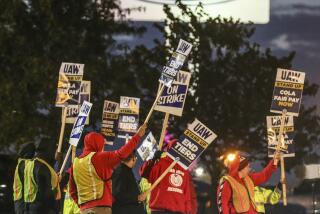Slaughterhouse sees absences on King Day
- Share via
FAYETTEVILLE, N.C. — A few hundred employees at a massive Smithfield Foods Inc. hog slaughterhouse missed work Monday after a union called for a walkout to protest the company’s decision to not make Martin Luther King Day a paid holiday.
But it was difficult to tell whether the workers didn’t come to work because of the union or because of other reasons, Smithfield spokesman Dennis Pittman said.
On a typical day, about 100 to 150 people miss a shift, and on Monday there were as many as 150 additional employees absent, Pittman said. He said that he couldn’t tell why the workers didn’t come but that the plant -- which has two daily shifts of 2,500 people -- continued operations.
The United Food and Commercial Workers union estimated that 400 people among the 2,500 scheduled to work Monday morning walked out or did not come to work. The union has been running an organizing campaign at the plant and already lost one election.
“Compared to the last Martin Luther King Day, it’s about the same,” Pittman said. “There was no walkout.”
Workers sent a petition to management last week demanding the King holiday. The company said that there wasn’t time to consider the request but that workers could use one of their annual 12 unpaid personal days to observe the holiday.
Employee Eugene Rogers said that he was taking a paid vacation day to honor King but that the company should make it a holiday.
Company executives will ask employees during a regular monthly meeting in February whether they want to substitute the 2008 King holiday for one of their eight paid holidays, Pittman said.
In the past, plant workers voted for Easter when given a choice between it and the King holiday as a paid holiday.
The plant in Tar Heel, N.C., about 80 miles south of Raleigh, employs about 5,000 people and is considered the largest hog processing plant in the world.
A large number of workers at the plant are black or Latino, union officials have said.
Three employees spoke at a commemorative service for King at First Baptist Church in Fayetteville, about 25 miles southeast of the plant.
“He died for the workers,” Johnnie Davis, a Smithfield worker for the last eight years, told the approximately 700 people at the church. “He died for us.”
The union also backed about 1,000 employees in November who walked off the job as a protest when the company fired 50 workers whose identification couldn’t be verified. The protesters were back on the job a day later after Smithfield agreed to give the workers 60 days to verify their information.
More to Read
Inside the business of entertainment
The Wide Shot brings you news, analysis and insights on everything from streaming wars to production — and what it all means for the future.
You may occasionally receive promotional content from the Los Angeles Times.










